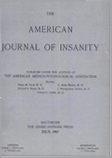NON-CONVULSIVE ELECTRIC (FARADIC) SHOCK THERAPY OF PSYCHOSES ASSOCIATED WITH ALCOHOLISM, DRUG INTOXICATION AND SYPHILIS
Abstract
Psyche and soma, interrelated, contribute to the "reaction of delirium" in toxic-organic psychoses. Delirious behavior is determined more by the type of personality of the individual than by the somatic changes in the brain.
Since the psychogenic psychoses showing delirious behavior appear to respond best to shock therapy, this method was employed in the treatment of acute toxic-organic psychoses. Non-convulsive electric (faradic) shock therapy, a safe, simple and, inexpensive procedure, was given daily in conjunction with psychotherapy and the usual routine therapeutic measures. Thus "reaction of delirium" and the underlying organic disturbances were treated concurrently.
In 67 cases of psychoses associated with alcohol and other drug intoxications, the duration of "reaction of delirium" was definitely shortened.
In five cases of psychoses associated with syphilis of the central nervous system (general paresis), the acute delirious reactions responded favorably to this type of treatment. One patient showed complete remission. Subsequent malarial therapy given to the other four patients failed to produce further striking clinical or serological improvement.
This preliminary study indicates that in "reaction of delirium" (toxic-organic psychoses) more effective results can be obtained by administering non-convulsive electric (faradic) shock therapy in conjunction with the customary routine medical procedures. Further investigations are being made.
Access content
To read the fulltext, please use one of the options below to sign in or purchase access.- Personal login
- Institutional Login
- Sign in via OpenAthens
- Register for access
-
Please login/register if you wish to pair your device and check access availability.
Not a subscriber?
PsychiatryOnline subscription options offer access to the DSM-5 library, books, journals, CME, and patient resources. This all-in-one virtual library provides psychiatrists and mental health professionals with key resources for diagnosis, treatment, research, and professional development.
Need more help? PsychiatryOnline Customer Service may be reached by emailing [email protected] or by calling 800-368-5777 (in the U.S.) or 703-907-7322 (outside the U.S.).



